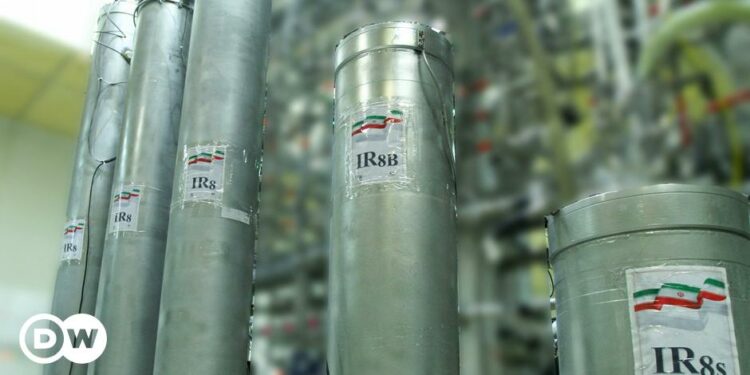To view this video please enable JavaScript, and consider upgrading to a web browser that supports HTML5 video
The French Foreign Ministry on Thursday said the talks were an effort toward a “diplomatic solution to the Iranian nuclear program, the progress of which is extremely problematic.”
“This is the continuation of the talks we had in December,” Baghaei said.
Potential for more pressure on Iran
In December, Iran and E3 representatives met for closed-door talks on the nuclear deal, with little details shared other than an Iranian Foreign Ministry statement that the discussion was “progressive.”
That sit down came after the US, UK and EU in November rejected an earlier offer from Iran to cap uranium enrichment at 60% and allow further inspections of nuclear facilities.
Subsequently, the E3 filed a motion at the IAEA, demanding a “comprehensive” report confirming Iran’s compliance with the JCPOA.
Iran could face a return of the UN Security Council sanctions regime after the nuclear deal formally expires in October, and the IAEA report would be the first step toward that outcome.
“In the coming months, we will have to ask ourselves whether to use … the mechanism to restore sanctions,” Macron said last week, referring to October’s expiration date.
The mechanism would allow nuclear deal signatories to reimpose harsher UN sanctions on Iran in cases of the “significant nonperformance” of commitments.
Since the United States pulled out in 2018, Iran’s documented development of nuclear material has given Western negotiators little basis for compromise.
In a June 2024 statement responding to an IAEA report on Iran’s nuclear program, the E3 said Iran’s continued nuclear development was “unprecedented” for a state without a nuclear weapons program.
The statement also said Iran had “significant” quantities of highly enriched uranium, “from which the possibility of manufacturing a nuclear explosive device cannot be excluded.”
The administration of US President Joe Biden has tried to revive the deal, and reportedly came close in 2022, but talks fell through, and negotiations since have gone nowhere.
Nazila Golestan, a Paris-based political activist, told DW in December that Iran’s weakening regional influence and growing domestic unrest leave the regime in a vulnerable position.
“The government faces a dual crisis: declining authority at home and diminishing power abroad. These pressures may force Iran to adopt a more conciliatory stance in international negotiations,” she said.
The talks in Geneva also come a week before Trump’s return to the White House. His administration is widely expected to take a hard line on Iran and its nuclear program.
Written with material from France’s AFP news agency.
DW’s Farsi department contributed to this report.
Source link : http://www.bing.com/news/apiclick.aspx?ref=FexRss&aid=&tid=6785f5ebfd12499199c65a5151f7dc07&url=https%3A%2F%2Fwww.dw.com%2Fen%2Feuropean-powers-resume-nuclear-talks-with-iran%2Fa-71286107&c=10662628326364416395&mkt=en-us
Author :
Publish date : 2025-01-13 11:26:00
Copyright for syndicated content belongs to the linked Source.



